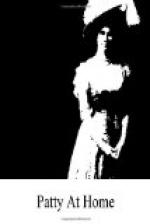“I’m so glad to see you,” said the latter, shaking hands effusively.
“Humph!” said Miss Daggett. “Why should you be glad to see me, pray?”
“Why, because—because—” Mrs. St. Clair floundered a little, and seemed really unable to give any reason.
“Because you’ve heard that I’m rich and old and queer?” said Miss Daggett.
This was exactly true, but Mrs. St. Clair did not care to admit it, so she said: “Why, no, not that; but I’ve heard my niece speak of you so often that I felt anxious to meet you.”
“Well, I’m not afraid of anything Patty Fairfield said about me; she’s a dear little girl; I’m very fond of her.”
“Why do you call her little girl?” said Mrs. St. Clair. “Patty is in her seventeenth year; surely that is not quite a child.”
“But she is a child at heart,” said Miss Daggett, “and I am glad of it. I would far rather see her with her pretty, sunshiny childish ways than to see her like that overdressed little minx standing over there beside her, whoever she may be.”
“That’s my daughter,” said Mrs. St. Clair, without, however, looking as deeply offended as she might have done.
“Oh, is it?” said Miss Daggett, sniffing. “Well, I see no reason to change my opinion of her, if she is.”
“No,” said Mrs. St. Clair, “of course we are each entitled to our own opinion. Now, I think my daughter more appropriately dressed than my niece. And I think your nephew will agree with me,” she added, smiling.
“My nephew!” snapped Miss Daggett. “Do you know him?”
“Oh, yes, indeed; we met Mr. Harper at a reception in New York not long ago, and he was very much charmed with my daughter Ethelyn.”
“He may have seemed so,” said Miss Daggett scornfully. “He is a very polite young man. But let me tell you, he admires Patty Fairfield more than any other girl he has ever seen. He told me so himself. And now, go away, if you please, I’m tired of talking to you.”
Mrs. St. Clair was not very much surprised at this speech, for Patty had told her of Miss Daggett’s summary method of dismissing people; and so, with a sweet smile and a bow, the fashionable matron left the eccentric and indignant spinster.
CHAPTER XVIII
A SAILING PARTY
After Aunt Isabel had gone home, Patty devoted herself to the entertainment of her young cousins. And they seemed to require a great deal of entertainment—both Ethelyn and Reginald wanted something done for their pleasure all the time. They did not hesitate to express very freely their opinions of the pleasures planned for them, and as they were sophisticated young persons, they frequently scorned the simple gaieties in which Patty and her Vernondale companions found pleasure. However, they condescended to be pleased at the idea of a sailing party, for, as there was no water near their own home, a yacht was a novelty to them. At first Ethelyn thought to appear interesting by expressing timid doubts as to the safety of the picnic party, but she soon found that the Vernondale young people had no foolish fears of that sort.




